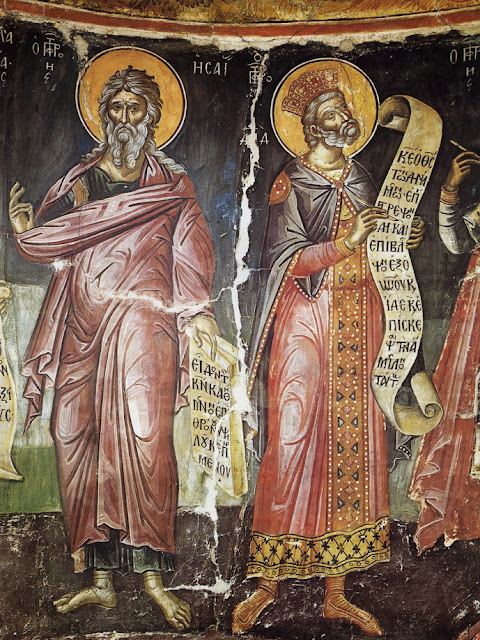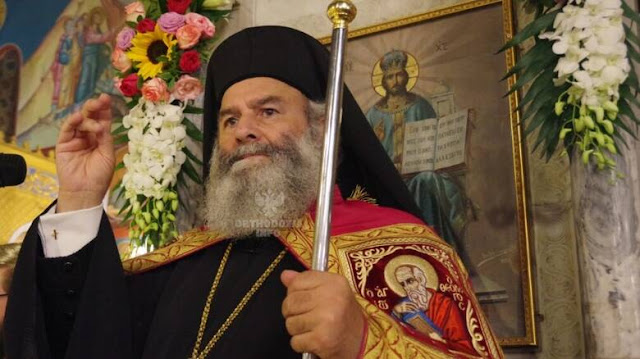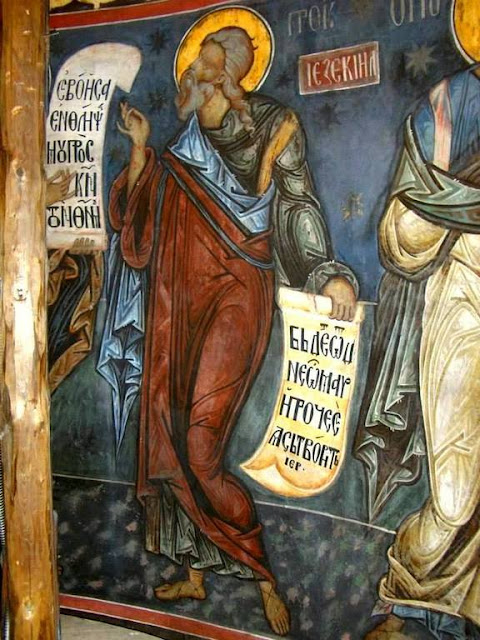July: Day 17:
Holy Great Martyr Marina
(On God's Love for Man)
By Archpriest Grigory Dyachenko
I. The Holy Great Martyr Marina, whose memory is celebrated today, was the daughter of an idol priest in Antioch in Pisidia; having lost her mother soon after her birth, she was given by her father to be brought up by a wet nurse living in a village on the outskirts of the city. Here, when she was twelve years old, Marina had the opportunity to get to know the Christians who, escaping the persecution brought against them under Diocletian, hid in the mountains and deserts and, disguised as beggars, spread the word of God among the people. Thus Marina also heard the “good news” and accepted it with all her heart. Having heard about what Christ the Savior did for people and what He taught people for their salvation and eternal blessedness in union with Him in His kingdom, the young Marina loved Christ with all her soul and thought only about learning more and more about Him and learning to live according to His law.
Love for Jesus Christ burned so much in the heart of young Marina that she could not hide it and openly confessed her faith in the Crucified Savior, although she knew that she could be subjected to cruel persecution for this. And indeed, soon the ruler of the East, Olimbrius, having met her and learned that she was a Christian, demanded that she be brought to trial.
“I want nothing more than to remain a faithful servant of my Savior!” Marina answered him, “and I should not be afraid of your threats, they should not prevent me from accepting suffering for the One Who Himself suffered for people.”
Seeing the firmness of the Christian, Olymbrius ordered her to be tortured. And Marina's blood flowed under the crushing blows; her whole body was torn; many of those present, pitying her, tearfully urged her to obey the ruler, and he himself covered his eyes so as not to see the torn body of the Martyr.
After the tortures, Marina was taken to prison. Here she faced a new difficult trial: fear and despondency seized her soul. Her body was tormented and she began to be troubled by terrible visions, but God, who dwelt in her soul, protected her from temptation. He visited her with a joyful vision, in the midst of which Marina heard the words: "Rejoice, Marina, you have conquered the malice of the enemy. Rejoice! Soon, like the wise virgins, you will enter the chamber of the immortal Bridegroom.” And at the same time the Martyr felt that her wounds were healing and her strength was returning. She felt the presence of the invisible God and her whole soul was filled with inexpressible joy and grateful prayer. In such a wonderful state she spent the rest of her imprisonment in the dungeon and when she was brought again to trial, she amazed everyone who saw her in the full splendor of beauty and health, as if she did not endure the tortures that tormented her.
Seeing this, many pagans, recognizing the wondrous power of the true God, turned to Him. The number of those who converted increased even more at the sight of the mMrtyr's patience when she was given over to new tortures. The people, struck by the miraculous signs during her suffering, believed in Christ to the number of 15,000, and all of them were put to death by order of Olymbrius, who was frightened by such a spread of the followers of Christ's teachings persecuted by him. Marina, among others, was also beheaded.
II. Christian brethren! We have seen that the conversion of the holy martyr Marina, a former pagan, to Christ followed from what she learned from Christians about what the Savior had done for people: her heart was captivated by God's divine love for man, and she believed in the Lord Jesus Christ with all her heart and soul and loved Him more than her life. If the heart of the martyr was so touched by the reflection on God's love for man, then how much more should the heart of a Christian be ablaze with the power of ardent love for God, after it has learned by experience the countless deeds of God's love for man?
a) In all the works of God, visible to our eyes, traces of the love of the Heavenly Father for us, unworthy sinners, are clearly inscribed. We are surrounded on all sides by living witnesses of His fatherly providence and care for us.
"Shall we look up to heaven?" - stretched out over our heads as a testimony day and night of the greatness of God's goodness to us? From there the merciful Heavenly Father shines His sun on the evil and the good, and rains on the righteous and the unrighteous.
"Shall we look upon the earth?" - how many witnesses are there of the mercy of our Lord and God towards us! By His command it feeds us and warms us, and clothes us and adorns us, and gladdens and comforts us with its inexhaustible treasures.
"Shall we look upon the beasts?" - created for our service? We shall see how the Heavenly Father provides for all our needs. In a word, we cannot open our eyes without seeing in all, even the smallest, creatures, traces of God's goodness to us. And if our hearts were always pure, we could never open our eyes without a feeling of deep reverence for the ineffable love of the Heavenly Father for us. Only unfortunate obstinacy in sins, and pernicious distraction in the vanities of this adulterous and sinful world, makes our hearts so insensitive that for the most part we look upon the greatness of God's works without reverence for His mercy; and often we so forget the goodness of the Lord God, that He, in His mercy, as if forced, finds Himself, in order to awaken in us love for Him, without which we would perish, visiting us sometimes with misfortunes and troubles. But even when He chastises us, He does not cease to be our Father; His hand that strikes us is always filled with treasures of blessings, which He immediately showers on us, as soon as we turn to Him.
b) But no matter how great the love of God is, revealed in the creation of the world and man, and continually revealed in His fatherly providence for us and for all creatures, it is still, so to speak, very small in comparison with that ineffable love which the Heavenly Father showed in the redemption of the fallen human race.
The universe came into being from nothingness by the single word of the Almighty: "He spoke, and it was, He commanded, and it was created." One sign of God was enough for heaven with all its luminaries, and the earth with all its adornment, to appear in all its beauty; and in order to redeem fallen man, the Only Begotten beloved Son of God leaves heaven and His throne, descends to the earth, covered with calamities and burdened with a curse for the sins of men, in order to unite the wretched earth with the blessed heaven and to abolish the curse, to pour out upon it abundantly all the blessings of the Heavenly Father. With infinite humility He takes upon Himself our mortal flesh and Himself becomes man, so that by His humility He may destroy the accursed pride of our forefathers, the source of the fall and all evils, and restore our fallen nature to its former, or rather to its highest and inalienable blessed state. And with what ineffable love for mankind this our Mediator, the Lord and Savior Christ, seeks our lost nature, this lost sheep, so that having found it, He may make it a partaker of His divine nature! Neither labors, nor sorrows, nor sufferings, nor anything tire Him. With what love, finally, our loving Savior lays down His all-holy soul for the salvation of our souls, pouring out on the cross all His divine blood to the last drop!
c) And with what inexhaustible abundance this love of God is poured out into our hearts, when we ourselves do not close them with our unbelief! The Heavenly Father, for the sake of the infinitely great sacrifice of His only-begotten, beloved Son, who offered His whole self for our salvation, opens to those who believe in Him the boundless treasures of His heart, pours out on them His Holy Spirit, Who by His Divine power drives out the darkness of sin from our hearts and gives us the light of faith, arouses us to true repentance, helps us in our infirmities, comforts us in our sorrows, intercedes for us with sighs that cannot be uttered, establishes within us the Kingdom of God; and if we constantly follow His attraction, it makes us holy, pure, capable of eternal union with the all-holy God, for eternal, never-ending blessedness in the heavenly abodes of light and life.
III. But in order to truly become a partaker of the salvation obtained for us by the blood and death of Jesus Christ, it is not enough to bear the name of children of God and Christians, but it is necessary to have the qualities of the sons of God - truly loving God, faithfully fulfilling His commandments out of love for Him; for the love of the Heavenly Father for us, we must reciprocally repay Him with our love. And He requires nothing more from our hearts than that we faithfully fulfill His commandments out of love for Him for our own blessednes.
We beseech you, brethren, by the mercies of God, if not always, then as often as possible, to turn the tender gaze of your hearts to the Love crucified for us, until Christ is formed in us, that you may be true children of God, heirs of God, and co-heirs with Christ in all the treasures of eternal life and blessedness prepared for those who love Him.
Source:
A Complete Annual Cycle of Short Teachings, Composed for Each Day of the Year. Translated by John Sanidopoulos.










_01_by_shakko.jpg)




























